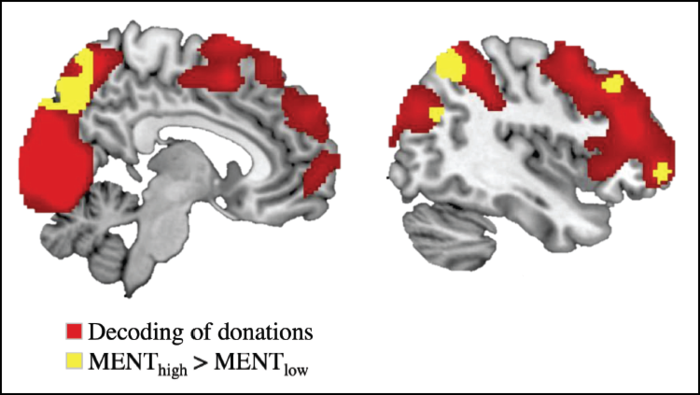The stress hormone cortisol reduces altruistic behavior and alters activity in brain regions linked to social decision making — but only in people who are better at imagining others’ mental states, according to new research published in JNeurosci.

Credit: Schulreich et al., JNeurosci 2022.
The stress hormone cortisol reduces altruistic behavior and alters activity in brain regions linked to social decision making — but only in people who are better at imagining others’ mental states, according to new research published in JNeurosci.
In a study from Universität Hamburg, participants decided how much money to donate to a selection of charities before and after completing a stressful public-speaking task while researchers monitored their brain activity with fMRI. To simulate the personal cost of making an altruistic decision, the participants received a portion of the money they did not donate. Before the stressful task, people with higher mentalizing ability, or the ability to imagine others’ mental states, donated more money than people with low mentalizing ability.
In people with high mentalizing ability, increased levels of the stress hormone cortisol decreased donations; cortisol had no effect on people with low mentalizing ability. The researchers could predict how high mentalizers would choose to donate based on activity in the dorsolateral prefrontal cortex (DLPFC), a brain region involved in social decision making. Yet higher levels of cortisol infringed on this pattern, indicating stress reduced the neural representation of donations in the DLPFC. These results reveal cortisol might alter the activity of the DLPFC, which has a more pronounced effect on people who rely on mentalizing to make social decisions.
###
Paper title: Altruism Under Stress: Cortisol Negatively Predicts Charitable Giving and Neural Value Representations Depending on Mentalizing Capacity
Please contact [email protected] for the full-text PDF and to join SfN’s journals media list.
About JNeurosci
JNeurosci, the Society for Neuroscience’s first journal, was launched in 1981 as a means to communicate the findings of the highest quality neuroscience research to the growing field. Today, the journal remains committed to publishing cutting-edge neuroscience that will have an immediate and lasting scientific impact, while responding to authors’ changing publishing needs, representing breadth of the field and diversity in authorship.
About The Society for Neuroscience
The Society for Neuroscience is the world’s largest organization of scientists and physicians devoted to understanding the brain and nervous system. The nonprofit organization, founded in 1969, now has nearly 37,000 members in more than 90 countries and over 130 chapters worldwide.
DOI
10.1523/JNEUROSCI.1870-21.2022
Method of Research
Experimental study
Subject of Research
People
Article Title
Altruism under stress: cortisol negatively predicts charitable giving and neural value representations depending on mentalizing capacity
Article Publication Date
14-Mar-2022




